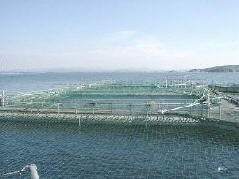|
The Pacific Fisheries Resource Conservation Council (PFRCC) advisory body to Canadian federal and provincial fisheries ministers this week released an advisory calling for care and voicing concern regarding the interaction of net-cage salmon farming with wild Pacific salmon stocks in BC.
And a covering letter from the council’s chairperson recalls the enormous damage done to BC’s forest industry by the intransigence done by both sides of the debate and the unwillingness of government to address concerns, and says the council sees similar parallels ands dangers in the present situation.
The advisory, entitled Wild Salmon and Aquaculture in British Columbia, stems from a consultant's report commissioned by the PFRCC and released largely without recommendations and virtually without comment from the PFRCC last week. That looked at the science which has been applied to the industry so far, as well as the current conditions and anticipated risks, and says the whole area is "rife with uncertainties".
The new advisory, says the council, "is aimed at helping governments, at a critical time, make more informed decisions about the future of the aquaculture sector in BC and, in the process, better ensure the long-term health of BC's wild salmon populations."
PFRCC chairperson and former federal fisheries minister John A. Fraser notes in his covering letter to the federal and provincial ministers that the advisory presents recommendations on measures to deal with identified risks to wild salmon stocks and also to the management of the fisheries and aquaculture industry, but also to deal with the public perceptions of what the PFRCC describes as "a confused and contradictory government role in the encouragement of aquaculture and protection of wild salmon."
In particular, the council urges the two governments to act in the following ways:
The precautionary principle should be applied in a much more rigorous way than is currently used in the evaluation of interaction risks between farmed and wild salmon stocks.
The aquaculture industry and governments should undertake a wide-ranging research and monitoring program on wild/farmed salmon interaction, and develop means and practices to mitigate salmon farming impacts, such as single year class stocking, marking farmed Pacific salmon, and adapting environmental standards such as ISO 14001.
The federal government should proceed immediately to formulate and implement a comprehensive wild salmon policy that explicitly states that wild salmon will be given priority in government decision-making.
Government supervision and regulation of wild and farmed salmon, especially for fish health and disease surveillance, should be integrated into single bay or area management units.
The PFRCC, whose statement comes immediately before an important workshop between industry and environmental groups on plans to address the issue of sea lice in the Broughton Archipelago, also proposes the creation of a Salmon Aquaculture Forum, including a multi-stakeholder scientific panel, to build public consensus about the future direction of the industry and identify ways to reduce the risk to wild salmon from BC's net-cage aquaculture operations.
Fraser concludes: "Wild salmon must come first; they cannot be replaced. Their survival depends, in large part, on the actions we take and care we exercise... The wild Pacific salmon represents a significant part of our natural heritage which we are bound by duty and by conscience to protect for future generations."
By Quentin Dodd
FIS North America
Top
|
